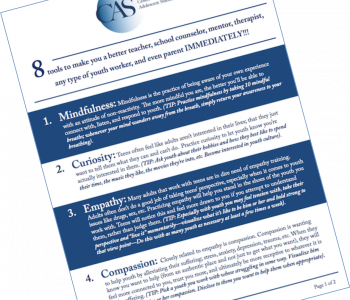

Sam Himelstein, PhD
Sam Himelstein is the founder and CEO of the Center for Adolescent Studies, Inc. He is passionate about working with youth and training the professionals that serve them.
Self-care is self-love: The most critical skill in the direct service industry
With Valentines Day recently passing, the media has flooded us with everything about love, relationships, and making our sweethearts feel great. Rarely when Valentines Day rolls around however, do we talk about a form of love that is so critical that its absence can cause an immense amount of personal suffering: love of ourselves. Self-love has many elements, and the one I’d like to focus on in this post is self-care. Self-care includes intentional practices that promote or own mental, emotional, physical, and spiritual well-being.
Why is self-care so important? Why is self-care a form of radical self-love?
Because in Western society we have a tendency to work the dogsh*t out of ourselves. Productivity is emphasized over happiness, work ethic over passion. While I agree that both work ethic and productivity are necessary aspects of a healthy worker, I find myself asking “but why not emphasize passion and happiness on the job to the same degree?” And some employers do, and I’m sure it’d be great to work at those jobs. But what are those jobs? They tend to be huge tech companies like Google, Yahoo, Facebook, etc. They tend NOT to be working as a therapist at a non-profit that contracts with the juvenile hall, or teaching positions at a high school in East Oakland, CA, or Detroit, MI. These jobs are sometimes so structurally dependent on work ethic and productivity that they become stepping-stones; places professionals work for “experience” until they move to another job (that’s higher paying and/or less stressful).
The ultimate truth we MUST face in the direct service industry, and especially for those of us working with underserved/marginalized youth, is that the very nature of our professions is not conducive to self-care. And that’s why self-care is the most critical skill to practice when doing this work; if we don’t take care of ourselves we burn out. We ultimately leave. And then those young people don’t get that caring adult relationship they deserve.
So, How Do We Practice Self-Care?
First, it’s important to do a brief assessment on the areas in your life that may be lacking self-care. These include the physical, mental/emotional, occupational, and spiritual realms. Do you get enough exercise? Eat as healthy as you’d like? So much research has shown the positive effects of simply exercising a few times per week and eating a moderately healthy diet. What about sleep? Personally, I have struggled with sleep my whole life. I’ve always stayed up late and had issues with waking up early to go to school, work, etc. I am lucky to work in a setting where I can adjust my schedule, so I recently changed my schedule from 8:30AM – 4:30PM to 10AM – 6PM. This has radically shifted my work life. My cognitive attention and emotional presence have greatly improved and I am so much happier, both at work and home.
And what about the mental/emotional elements of self-care? What do you do for stress relief? How do you deal with a hard day at work? You might practice meditation, or seek emotional support from a friend, or even go to a professional. What’s important is that you have some outlet to express your mental and emotional baggage. Personally I practice mindfulness meditation almost daily. It helps with my ability to deal with high stress environments, to deal with emotionally unstable people (both clients AND co-workers), and helps me stay calm and centered even in some of the most toxic situations. I also utilize the people in my life for support; there’s nothing quite like feeling fully heard by someone that cares about you (that’s why I became a therapist, wink wink).
How about occupational self-care? Yes, this whole post is about self-care related to the work world and how all these aspects of self-care can help us do our jobs better, but what I mean here is how we can make our jobs (even if by the slightest) more conducive to self-care on a structural level. That might mean advocating for different policies, having tough conversations with our supervisors, and doing anything we can to make the job itself a place that’s more caring and less cutthroat.
Just a few weeks ago our agency had to reassign a number of positions to different departments. The folks who got reassigned were not happy and the announcement was done in a not-so-skillful way. This created more anxiety than anticipated from management and contributed to a very heavy workday. Someone in the agency suggested that there might have been a better way to break the news; the agency found out at a staff meeting and the people who were reassigned found just before that staff meeting. Another suggested that we as staff don’t engage in gossip given that it would just make things worse. Everyone understood that such things happen from time to time, and management themselves had no choice in the matter. Ultimately the recommendations above helped the agency feel like a safer place in those moments (and these were just simple recommendations).
There may be many ways you can advocate for a better work environment at your job. I suggest writing down a few things (even if you keep them to yourself) that can be done. Start a dialogue with colleagues and if you feel safe enough, supervisors. If you don’t feel safe enough to talk with supervisors, write that down as something that could help contribute to a safer environment if rectified.
Finally, the spiritual realm of self-care. Spiritual can mean different things to different people, and I certainly don’t mean to trigger anyone. For me in the context of working with youth it means connecting to something larger than myself and being in service. For you it might mean being guided by God, the Universe, or whatever beliefs you have. I sincerely believe that when we traverse beyond our own egos to serve something greater, we help our young people more and are happier in our work roles. Think about your overall meaning, purpose, and what guides you in your work.
Self-Care Challenge
After reading this post, think of at least 1-2 self-care practices in each of the above realms (physical, mental/emotional, occupational, spiritual) that you’d like to experiment with. Try them for a couple of weeks. If they work, keep them in your self-care tool belt. If not, experiment with others. Keep experimenting until you find something that works for you. You might have a lot of self-care practices in one of the above realms and none in another. That’s okay. Create your own unique self-care practice that helps you show up as the most present, caring, and happy adult for those young people you work with. This will sustain you and contribute to more authentic happiness.
—
When we engage in the practice of self-care, we soothe ourselves from the stress, hardship, and trauma we face at the job and that our young people face. When we show up at our best; with compassion, presence, happiness, and with passion we serve our young people to the highest level. And we also will be happier, more relaxed, and feel more connected to our jobs as meaningful endeavors. That’s what makes self-care a form of radical self-love. We go against the stream of productivity without passion and work ethic without happiness. We acknowledge ourselves as the major tool we use to help young people and the fact that we need taking care of; sharpening, upkeep, and support like any other tool. That is the importance of a continuous self-care practice. Happy Valentines Day!
Here are just a few more posts to support your self-care and resilience practices:
3 Must-Read Books About Self-Care and Personal Growth
5 Ways to Practice Self-Care When You’re Exhausted and Overwhelmed
How Can I Focus on Self-Care When There’s Endless Need?
How Can I Help Others When I’m Struggling Myself?
Practice regular self-care and resilience with a community of equally dedicated, like-minded helping professionals by signing up for the FREE Resilience Community. Joining takes just 2 minutes!

